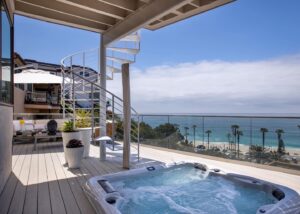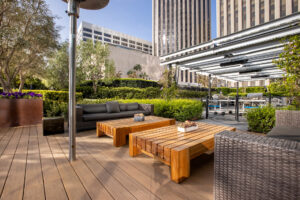PVC vs. Composite Decking: What LA Homeowners Should Know
Choosing the right decking material can feel overwhelming, especially when both PVC and composite decking promise durability, style, and low maintenance. But the differences between them run deeper than just aesthetics or price. If you’re weighing up the PVC VS Composite debate, it’s important to look past surface features. From how they handle the LA heat to the surprising ways they impact long-term costs, understanding these nuances can save you time, money, and future headaches. Here’s what you won’t hear in the typical decking comparison—and how LA Decks can help you make the best choice for your space.

Heat Retention: When Your Deck Becomes Too Hot to Handle
In sunny Southern California, heat retention isn’t just an afterthought—it’s a key factor. PVC decking, known for its plastic core, tends to absorb and retain more heat compared to composite boards, which combine wood fibers with recycled plastics. This means PVC decks can get uncomfortably hot underfoot, especially during peak summer months. Composite decking materials, like those from TimberTech and Trex, are engineered to stay cooler, offering a more pleasant experience for bare feet.
If you’re considering a rooftop deck, heat retention is even more critical. Rooftop decks get direct, intense sunlight, making composite a cooler, more comfortable option in these elevated spaces.

Noise Levels: The Sound Underfoot You Didn’t Expect
This might not be on your radar, but the noise factor can affect how you experience your deck. PVC decking often has a hollow sound when walked on due to its all-plastic construction. In contrast, composite decking, with its wood fiber blend, tends to offer a denser, quieter feel underfoot. For homeowners who value a peaceful outdoor retreat—or for those designing commercial decks where ambiance matters—this is a subtle but important detail.
Color Fading: How Each Material Ages in the LA Sun
Both PVC and composite decking resist fading better than traditional wood, but they age differently. PVC’s color holds up well initially, but over the years, it can develop more noticeable discoloration, especially in high-exposure areas. Composite decking tends to fade more evenly, often giving it a natural, weathered look that some homeowners prefer. TimberTech’s capped composite boards, for example, are designed to minimize fading while maintaining a wood-like appearance.
For LA homeowners looking to maintain that just-installed look without constant upkeep, this difference is important to take into consideration.

Unexpected Repair Costs: What Happens When Damage Strikes
Both materials are low-maintenance, but repairs are a different story. PVC boards, while durable, can be tricky to replace seamlessly. Over time, color batches change, making new boards stand out against older ones. Composite decking, on the other hand, blends better after repairs, thanks to its natural fading pattern and consistent texture. For long-term homeowners or those managing commercial decks, this could mean fewer headaches (and costs) down the line.
Environmental Impact: The Sustainability Trade-Off
Many assume composite decking is the greener choice due to its recycled content, but PVC decking has its own eco-friendly perks. Brands like TimberTech and Trex incorporate a high percentage of recycled materials in their composite boards, while certain PVC products are now fully recyclable at the end of their life cycle. However, the energy footprint of manufacturing each material differs, with composites generally requiring less energy during production. If sustainability is a priority, understanding these trade-offs can help align your deck with your values.

Why LA Decks is the Right Partner for Your Project
As deck builders 20 years in the industry, LA Decks specializes in installing both PVC and composite decking, working closely with top brands like TimberTech, Trex, Fiberon, and Deckorators. Our team has helped countless homeowners and businesses across LA and Orange County find the right fit for their outdoor spaces. To get a sense of the composite decking projects we’ve completed, check out our project portfolio.
PVC vs Composite Decking FAQs
Q: Which is more expensive: PVC or composite decking?
A: PVC decking generally comes with a higher upfront cost compared to composite decking. However, long-term factors like maintenance, repairs, and potential replacement should also be considered.
Q: Which material is better for rooftop decks in Los Angeles?
A: Composite decking is often a better choice for rooftop decks because it retains less heat and offers a more natural, comfortable feel underfoot.
Q: How long do PVC and composite decks last?
A: Both materials offer impressive longevity. PVC decks can last 25-30 years, while high-quality composite decks from brands like TimberTech and Trex often come with warranties of 25 years or more.
Q: Are there eco-friendly options for both materials?
A: Yes! Many composite decking products incorporate recycled materials, and some PVC decking brands now offer fully recyclable options. Both can be sustainable choices depending on your priorities.

 CONTACT US
CONTACT US CALL US
CALL US